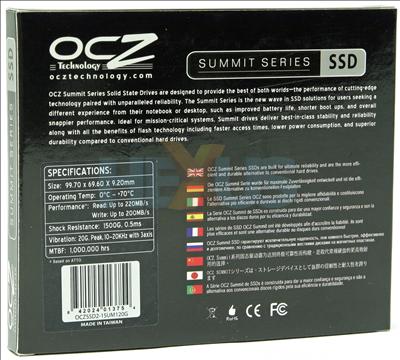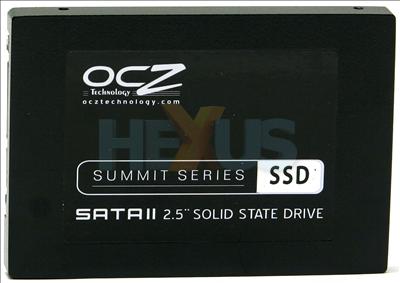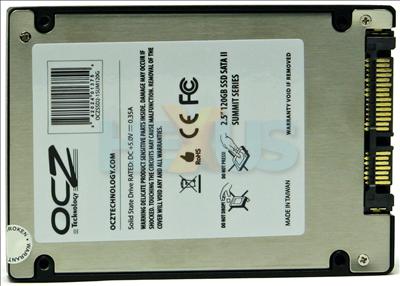The drive
The Summit range of 2.5in SSDs fit into the OCZ's performance category alongside the recently-reviewed Vertex. Encompassing three drives with 60GB (64GB), 120GB (128GB), and 250GB (256GB) capacities, the two higher-capacity models sport faster write speeds, as show by the table, below.| Summit drive | 64GB* | 128GB* | 256GB* |
|---|---|---|---|
| Read speed (up to) | 220MB/s | 220MB/s | 220MB/s |
| Write speed (up to) | 125MB/s |
200MB/s |
200MB/s |
| Sustained write speed | 120MB/s | 200MB/s |
200MB/s |
| Drive buffer | 128MB |
128MB | 128MB |
| Etail price (as at 01/08/09) | £141 | £240 |
£515 |
| £ per GB | £2.20 |
£1.875 |
£2.01 |
*OCZ labels the drives up in binary rather than SI fashion. The end result is that the 120GB drive is, for all intents and purposes, identical to 128GB models from the competition.
Peak transfer rates are excellent, but so they should be when one factors in the price, which is close to £2 per GB for all capacities. We have little doubt that the prices will continue to move downards apace in the next few months, especially with Intel's new 34nm-based consumer drives coming to the market.
Here's a badly-kept secret. The majority of high-performance drives are rebadged versions of OEM models manufactured by larger memory manufacturers. The OCZ Summit and Corsair P256 are cases in point. They're both made by Samsung and, depending upon when purchased, have identical firmware. What you're paying for, in effect, is the support and pricing from third-party companies who specialise in cutting-edge hardware.
The 120GB/128GB Summit/Samsung has some tasty figures to go along with the premium price. 220MB/s read and 200MB/s (sustained) write are helped along by a 128MB on-drive cache.
Measuring 99.8mm x 69.6mm x 9.3mm and weighing in at 77g, one of SSD's advantages lies with sheer portability and 'knockability'. Drop it from a few feet and the only damage should be a slight scuff on the aluminium surround. Should matters go awry in regular usage, OCZ backs it up with a (limited) three-year warranty.
The SATA2 interface is fast enough to ensure that bandwidth limitations don't impinge upon drive performance, but we'll be seeing SATA 6Gbps before too long; motherboard controllers have already been showcased on Intel P55-chipset-based motherboards.














